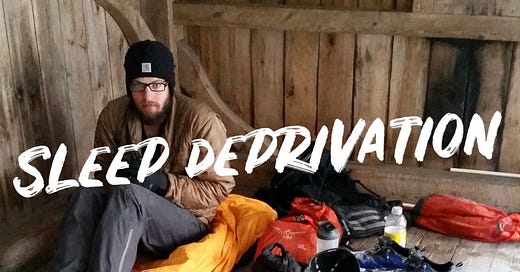I coach an athlete who has a 200-miler coming up this week, and we’ve been chatting about the Problem-Solving Mindset. A big part of this is keeping the motivation to solve problems even when you’re so tired you start mistaking a tree for your pacer. A 200-miler automatically drops you into the sleep deprivation club, and so does a 100-miler (unless you’re Rajpaul Pannu).
So, let’s dive into some sleep deprivation science that applies to ultrarunning and, more specifically, my upcoming race: Cocodona 250.
Effects of Sleep Deprivation
Sleep deprivation makes you worse at a lot of things, but let’s focus on the most relevant for running:
Cognitive Function: Reduced alertness, slower reaction times, and poor decision-making
Physical Performance: Decreased endurance, increased perception of effort, and reduced coordination.
Mood and Motivation: Heightened irritability and an increased likelihood of quitting (or irrationally yelling at your crew).
Science backs this up. There are many studies (here’s one) showing that the level of sleep deprivation, combined with the duration and style of exercise, directly impacts performance. Essentially, the less you sleep, the worse you are, especially if you're running further. Bad news for ultrarunning—but then again, that’s probably why we do it, right?
How to Combat Sleep Deprivation
I actually learned a few strategies while diving into the science that I have never implemented. Despite being in a sleep-deprived state a lot! Last year, I missed 12 nights of sleep through FKTs, 100s, Cocodona, pacing, race direction, crewing races, etc. So, I consider myself experienced in the feeling, but maybe not all the strategies! So, let’s dive into them.
1. Sleep Banking
What It Does: Banking extra sleep before the race can help offset sleep debt.
The Science: One study grouped people by sleep amounts (10 hours vs. 7 hours), and—big surprise—the 10-hour group performed better with fewer lapses through a period of sleep deprivation that followed.
How to Implement: Sleep more before your race... if you can. Easier said than done.
2. Strategic Caffeine Use
What It Does: Stimulates the central nervous system, increasing alertness and reducing perceived effort.
The Science: A study with an editor's nightmare of a title—“Repeated Low-Dose Caffeine Ingestion During a Night of Total Sleep Deprivation Improves Endurance Performance and Cognitive Function in Young Recreational Runners: A Randomized, Double-Blind, Placebo-Controlled Study”—found that caffeine improved endurance by 5.2% with sleep and 8.9% without sleep compared the control groups.
How to Implement: Small, controlled caffeine hits (2mg/kg) every 3 hours through a sleepless night are what the study points to.
3. Napping During the Race
What It Does: Even short naps (20 minutes) can reset the brain and reduce cognitive fatigue.
The Science: A study on sprinting showed that after 4 hours of sleep overnight, a 30-minute nap improved sprint performance, cognitive alertness, and reaction times compared to the control group.
4. Light Exposure & Brighter Headlamps
What It Does: Bright light exposure helps regulate circadian rhythms and keeps you more awake during nighttime running.
The Science: Harder to find something exactly for endurance athletes, but studies show blue light increases alertness and enhances cognitive performance (here’s one).
While there's no direct endurance study, I know from experience that a brighter headlamp helps me stay awake.
How to Implement: Use a high-lumen headlamp—the brighter, the better.
5. Training for Sleep Deprivation (Don’t do this one, probably)
What It Does: Hypothetically increases resilience, but I’m not convinced.
The Science: One study had an n=1 (meaning just one test subject), which isn’t great. Another study focused on military operations and showed some improved decision-making—but also linked this to mental health disorders over time. So, uh… maybe not worth it? I am not even going to link the studies here…
How to Implement: Probably don’t. Training while under-slept might do more harm than good.
6. Other Techniques
Mindset & Mental Strategies: Studies show that positive self-talk, visualization, and goal-setting can improve mood and alertness. (Might be worth a whole separate post because there is a lot here.)
Nutrition: Keeping blood sugar stable can help combat cognitive declines. Sleep deprivation messes with glucose metabolism, leading to energy crashes. Do I have a foolproof solution? No. But this definitely explains those wild energy swings at 3 AM. Most of this research is funded by BIG DIABETES, but I think there is something here in terms of maintaining even blood sugar and metabolizing more complex carbs (as many as you can stomach).
What Should You Do?
“Presleep”: Sleep banking seems more beneficial than I initially thought.
Strategic Caffeine: Small doses over time are better than a massive jolt.
Short Naps: 20-minute naps appear to be a solid reset.
Get a Brighter Headlamp: More light = more alertness. Even if the endurance-specific studies aren’t there yet, my own experience tells me this works.
Mental Strategies before and during the race
Stick to your nutrition plan
If you liked this so far, consider checking out the rest of the things I put out this week:
Will Murray joined the podcast to talk about getting a Golden Ticket to Western States at Black Canyon 100k. This interview was awesome for self talk, mindset, and training goals.
I interviewed Kelly Newlon on the podcast and we talked about Real Athlete Diets, and how it is being an agent in the trail running space. This was a great conversation with many takeaways.
Derrick Lytle and I did a recap of the Black Canyon 100k but in a more fun way than most! Check out the YouTube video.
Training Recap
I hit 100 miles this week if you combine backpacking and running (33 backpacking miles)
Logged 11k of vert
It was a more open week, but the intention was to treat myself as an athlete and prioritize a more volume.
I am sure I put out some more stuff, but that is all that made it into this newsletter!




